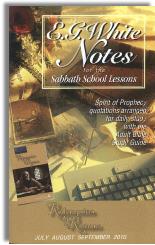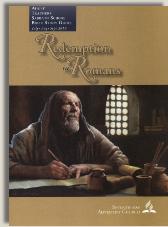|
||||||||||||||
Commentary on "All the Rest Is Commentary"
Day 4: Tuesday, September 21, 2010 - Giving No Offense
Overview
Today, the Lesson tries to summarize Paul, and states, “Although diet is important, Christians ought not to quarrel over the choice on the part of some to eat vegetables instead of flesh meats that might have been sacrificed to idols. Instead, they ought to focus on righteousness, peace, and joy in the Holy Spirit.” It then asks how this can be applied to the Adventist health message on diets, and how we should handle differences of opinion.
What we do is others’ business also, the Lesson points out, because others are observing and may imitate us. They may look up to us and be influenced to do something “wrong,” leading them down a path with unfortunate results. We are responsible for others because our example can lead others astray.
Observations
Nowhere in the book of Romans (or any NT book, for that matter) is a particular diet stated as important for the believer. Even Acts 15 does not specify a diet. Specific foods are never the issue for Paul, for these are disputable matters that are only important in how they affect the faith of the believers. Twice in chapter 14 he does mention diet, only to say that as one taught by the Lord Jesus, there is nothing unclean in itself. A food type becomes unclean when a person believes it is unclean.
Paul told the Corinthians to eat whatever was in the meat market without questions regarding conscience. Their meat markets contained all manner of things that would have horrified an Israelite, and also for us moderns worried about contamination. We can be sure those fly-infested Roman markets would never have passed any modern health inspection. But all this focus on foods had nothing to do with sin. If one of the members with “strong” faith had roasted a pig and brought it to church potluck, he might have displeased the Jewish brethren, but meats of themselves would not have made anyone “go astray.” Foods are merely external things that are passed on through the body and don’t enter the heart (Mark 7:19).
For Paul, the problem was never what was eaten. He was concerned that the Roman church members’ were trying to violate the consciences of others by spiritual arm-twisting and social ostracism, creating a crisis of faith. Guilting or belittling others will affect the heart, for anything outside of trust in God is sin. It was also a sin to knowingly “put a stumbling block” in the way of a brother and grieve him. For the strong-faith member, eating the pig privately could honor God, for our Lord had taught Paul that nothing was unclean. But with some of his Jewish siblings, his blessing would be spoken of as evil.
In Romans 14, we are given the most profound reasons not to judge others in disputable practices. We have seen how those who partake and those who abstain can both be honoring the Lord, for they are acting in faith. However, even though we are polite, in our hearts we often secretly despise people who make different choices about such things, causing us to act in a condescending manner, or even to shun them. We desperately need knowledge that will change our proud, judgmental attitudes. In verses 7-9, Paul, through the Holy Spirit, gives us just that. Verse 7:
“For none of us lives to himself, and none of us dies to himself.”
So the answer is to be unselfish and altruistic? No, see verse 8:
“For if we live, we live to the Lord, and if we die, we die to the Lord. So then, whether we live or whether we die, we are the Lord’s.”
The answer is, we do not own our lives or any part of ourselves, even and especially when we die. We are the Lord’s. We were bought with a price, we are not our own possessions, ever! And how is that? Verse 9:
“For to this end Christ died and lived again, that he might be Lord both of the dead and of the living.”
This is the Gospel that was once and for all delivered to the saints (Romans 15:1-3; Jude 3), that Jesus died, was buried, and rose to life. He destroyed the power of death, and was given possession of both the dead and the living. Christ joined together the two extreme parts of our existence, life and death, so that he might be our Lord in all things.
Paul compares life versus death to eating versus not eating. Either we are enjoying physical pleasures or abstaining from those pleasures. When we are alive, we live “under the sun,” enjoying the gifts that God gives us, as Solomon describes in Ecclesiastes 9. We can eat and drink or hold a squirming puppy when we are alive, all to His glory.
But when we die, how can we glorify God? All those enjoyments of our physical world are gone; there is no more knowing or participating in any pleasure under the sun—until we have new bodies. We are abstaining from all those things when we are dead, for none are more abstinent than the dead. Even there, we are still the Lord’s, as Jesus said, “God is not the God of the dead, but of the living” (Luke 20:38). He is always our Lord even when our bodies are in the grave. We can glorify Christ in that state, for there, Jesus is all we have. That is how Paul could say, “My desire is to depart and be with Christ, for that is far better” (Phil. 1:23). Knowing that Christ is both the Lord of the dead and of the living, we will treasure Him when our cup runs over, or in the valley of death’s shadow.
Summary
- The New Testament does not recommend any particular foods or diets.
- Producing guilt or shame in fellow members over food is a sin.
- Our proud hearts must know that Jesus Christ is Lord of both life and death.
- Just as we can glorify God in life and death, we can also glorify Him in enjoying life’s gifts, or in abstaining from them.
Copyright 2010 BibleStudiesForAdventists.com. All rights reserved. Revised September 21, 2010. This website is published by Life Assurance Ministries, Glendale, Arizona, USA, the publisher of Proclamation! Magazine. Contact email: BibleStudiesForAdventists@gmail.com.
The Sabbath School Bible Study Guide and the corresponding E.G. White Notes are published by Pacific Press Publishing Association, which is owned and operated by the Seventh-day Adventist church. The current quarter's editions are pictured above.
Official Adventist Resources
Standard Edition Study Guide Week 13
Teacher's Edition Study Guide Week 13
Easy Reading Edition Study Guide Wk 13
Search the Complete Published Ellen G. White Writings


